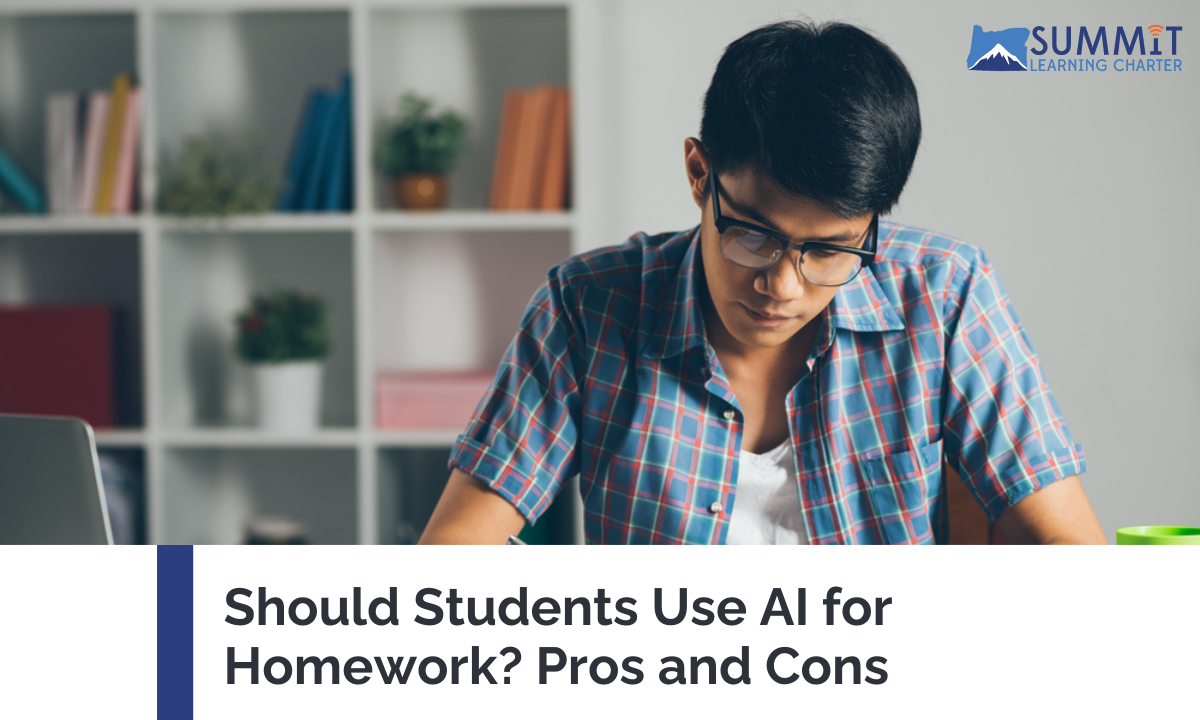
Should Students Use AI for Homework? Pros and Cons
The use of artificial intelligence (AI) in academics is a hotly debated topic. Using AI to cheat on assignments is never acceptable. But are there ethical ways that students can utilize AI tools? Is there some benefit to teaching students how to engage with these tools responsibly?
Teachers, parents, advocates, and school administrators hold different opinions on students using AI in school. Many argue that it’s okay for students to use AI as a research tool to help them generate ideas and gather information for homework assignments. But AI tools should never be used to write academic papers or answer questions for graded assignments.
Examples of AI Tools

There are many different variations of AI that could be used by students to complete homework assignments. Some are free and publicly accessible, while others operate as paid services.
The most common types of AI tools include:
- Chatbots: Generative chatbots can respond to questions that users type into chats within seconds, oftering detailed explanations and summaries of topics by drawing from publicly available online information.
- Writing assistants: AI-powered writing assistants are designed to help human writers proofread, edit, and improve their writing; these tools identify issues like repetition, spelling errors, punctuation errors, and run-on sentences
- Image generation: AI art-generation tools use complex algorithms to create detailed images, artwork, and patterns based on existing images.
- AI tutors: AI tutoring systems work by providing step-by-step instructions and practice problems, responding to questions, assessing learning progress, and offering comments and feedback.
Is Using AI for Homework Cheating?
One of the biggest concerns about the widespread availability of AI is that students will use it to cheat on homework assignments.
Cheating in school has always been a problem in K-12 education and in university settings. Cheating is bad for teachers. It makes their jobs harder and it undermines the important work they do. Most importantly, cheating is bad for students. It corrupts the learning process, encourages laziness, and leaves them without a thorough education.
To some extent, whether or not using AI is cheating is up to individual teachers. If a teacher tells their students not to use AI for homework, it’s always cheating to break this rule. But in some cases, teachers may even encourage students to utilize certain AI tools in order to teach them how to use these tools responsibly.
How Teachers Can Deter AI Cheating

With AI tools now publicly available to students, AI cheating has become a major issue. But there are some important strategies teachers at virtual schools can use to deter students from using AI to cheat on assignments when they design their courses:
- Educate students about the importance of academic integrity; teach them the definition and risks of cheating.
- Encourage supervision from Learning Coaches.
- Ask students to show their work and explain how they reached their conclusions.
- Incorporate interactive and hands-on elements in homework assignments.
- Ask for opinions, not just facts.
- Incorporate case studies, problems, or examples that aren’t available online.
- Use a combination of different assessments (worksheets, exams, written assignments, presentations, group projects, etc.).
Cons of Using AI for Homework
1. May Encourage Cheating or Plagiarism
Unfortunately, some students will use AI to write essays or solve equations rather than turning in their own original work. Asking AI to do your homework for you can be tempting, especially if you’re on a tight deadline.
But trying to pass AI-created content as your own is never acceptable and is considered a form of plagiarism. AI should only be used (if at all) to supplement study and clarify background information, never to do your homework for you.
2. May Reduce Student Engagement
Over-reliance on AI may have detrimental effects on student motivation. Students may think of AI as a shortcut, rather than a tool. Using AI to generate ideas and perspectives may prevent students from engaging deeply with the topic and reaching their own unique conclusions.
3. May Provide Inaccurate Information
AI isn’t always accurate. In fact, there are many examples of AI chatbots providing incorrect, incomplete, or misleading answers. Because AI draws from existing online content, it’s prone to repeating errors and misinformation. When using AI for background research, you should always seek out reputable sources to verify information.
4. May Prevent Students From Learning Valuable Skills
One of the main benefits of homework is that it encourages independent study, which offers a number of educational benefits. Taking a proactive approach by tackling difficult assignments independently can teach essential skills, including:
- Problem-solving
- Research
- Analysis
- Critical thinking
Relying too heavily on AI for homework assignments robs students of these skills and may leave them unprepared for life outside the classroom.
Pros of Using AI for Homework
1. Can Improve Accessibility
In some cases, AI can offer helpful resources that make learning accessible to all students, including those with disabilities. Some examples include:
- Real-time closed captioning for deaf and hard-of-hearing students
- Text-to-speech automations for students with visual impairments
- Speech-to-text automations for students with mobility concerns that make typing difficult or impossible
- Assistance technology for neurodivergent students or those with learning disabilities like dyslexia
2. Can Be a Supplemental Tool for Research
While AI should never be your only resource, it can help you understand the basics of broad ideas. Similar to a google search, students can benefit from asking AI to clarify information or explain a concept in a new way.
Keep in mind that while using AI for research can be helpful, you should always fact-check the information using reliable sources.
3. Can Improve Efficiency
When used appropriately, AI may help students learn how to develop more efficient study habits. For example, students may use AI to help plan out study schedules, learn new methods for knowledge retention, and clarify certain concepts. But again, AI should only be used as a helpful tool, not as a replacement for study.
4. Can Teach Students To Engage Responsibly With AI
AI is likely here to stay, and it’s important that we all learn how to use it responsibly. In fact, understanding AI, how it works, and how to use it may become a requirement for many jobs in the future.
Teachers can use the classroom as an opportunity to teach students about the ethical and practical concerns of AI. This can help prepare students for an increasingly digital world.
Encouraging Ethical, Active Learning at Summit Learning Charter!
As an accredited virtual K-12 school in Oregon, we understand that technology will continue to evolve and expand. That’s why it’s essential to teach students to use the tools at their disposal ethically and responsibly.
At Summit Learning Charter, we maintain strict ethical standards while providing students with the human and technical support they need to reach their full potential. As AI continues to expand, it’s more important than ever to have teachers, counselors, and Learning Coaches who are committed to all our students.
Contact us today to learn more about SLC’s virtual academy.




